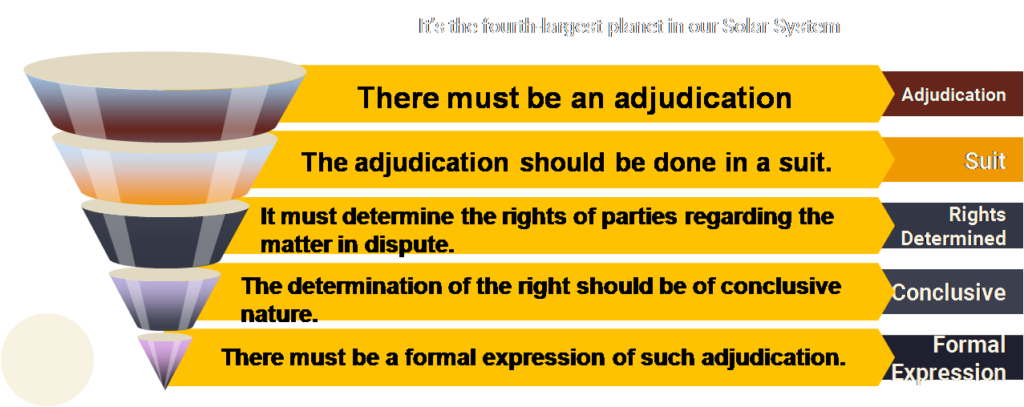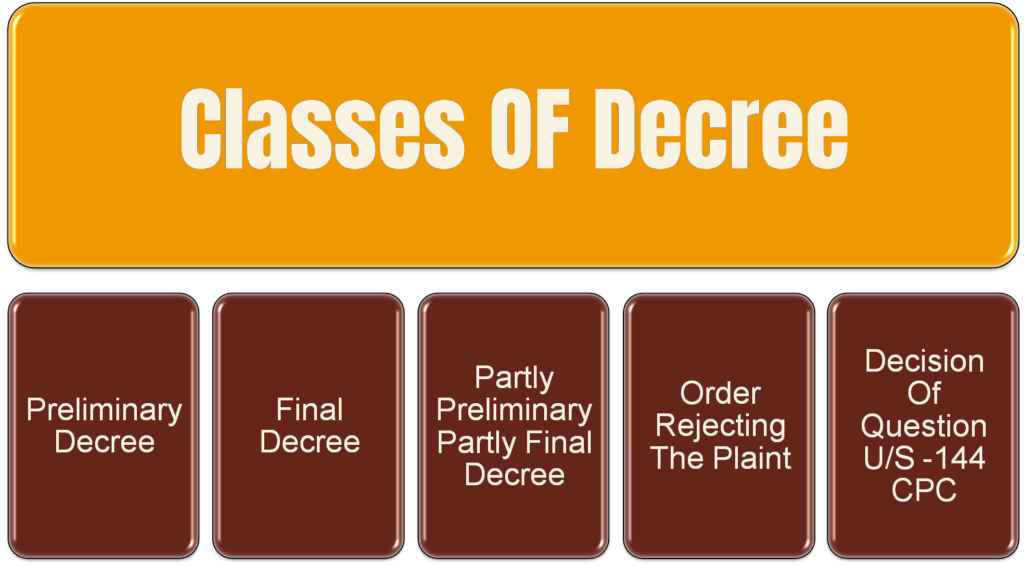DECREE Section- 2(2) of CPC 1908
Decree: Section 2(2) of the Code of Civil Procedure defines Decree as follows:-
Decree means the formal expression of an adjudication which, so far as regards the court expressing it, conclusively determines the rights of the parties with regard to all or any of the matters in controversy in the suit and may be either preliminary or final.
It shall be deemed to include the rejection of a plaint and the determination of any question within section 47 or section 144, but shall not include-
(a) any adjudication from which an appeal lies as an appeal from an order, or
(b) any order of dismissal for default.
Explanation.-A decree is preliminary when further proceedings have to be taken before the suit can be completely disposed of. It is final when such adjudication completely disposes of the suit. It may be partly preliminary and partly final:
Essentials Elements of a Decree

Adjudication
The Application Of Judicial Mind in order to decide a controversy in a Suit by the Person on which the Statute or Law conferred authority .
For a decision of the court to a decree, there must be an adjudication. The matter in dispute should be judicially determined. As held in the case of Madan Naik v. Hansubala Devi, if the matter is not judicially determined then, it is not a decree.
So, if the decision is of administrative nature then it can not be considered as a decree. Also, any order for dismissal of suit due to default in the appearance of parties or order for dismissal of an appeal cannot be considered as a decree.
As held in the Deep Chand v. Land Acquisition Officer, the adjudication should be made by the officer of the Court and if it is not passed by an officer of the court then it is not a decree.
Suit
The term suit is not defined under the in the C.P.C. but by various decisions it can be said that “Suit ordinarily means a civil proceedings instituted by presentation of a plaint.
In other words- Suit is a civil proceedings initiated in a court of law for redressal of legal injury or enforcement of a civil right, and it is a continuous process from the stage of initiation till the stage of securing the relief sought for in the suit.

Right In Controversy
The rights of parties which are in controversy must be determined by a formal adjudication. The rights determined under this circumstance are substantial rights and not procedural rights. The parties to the rights in controversy should be the plaintiffs and defendants and, if an order is passed upon the application made by a third party who is a stranger to suit then it is not a decree.
The matter in controversy should be the subject matter of the suit regarding which the relief is sought. Any question regarding the status and characters of party suing, the jurisdiction of the court, maintainability of suit or any other preliminary matter is covered under this.
Conclusive Determination
The decision must be one which is complete and final as regards the court which passed it. This means that the court will not entertain any argument to change the decision i.e. as far as the court is concerned, the matter in issue stands resolved
As held in the case of Narayan Chandra v. Pratirodh Sahini, the determination should be final and conclusive regarding the court which passes it.
The main point to be kept in mind is that whether the decision made is final and conclusive in essence as well as substance. If it is so, then the decision will be considered as a decree, else not.
Formal Expression
The adjudication should be expressed formally and such formal expression should be given in the manner prescribed by law. The decree should be drawn separately and it should follow the judgement. No appeal lies the judgement if the decree is not formally drawn upon the judgement.
| Decisions considered as a decree | Decisions not considered as a decree |
|
|

Preliminary Decree
A decree is stated as a preliminary decree when the rights of parties regarding all or any of the matter in dispute are determined in the adjudication but it does not dispose of the suit completely.
Supreme Court In the Case of Venktata Reddy v. Pethi Reddy held
A preliminary decree passed, whether it is in a mort- gage suit or a partition suit, is not a tentative decree but must, in so far as the matters dealt with by it are concerned, be regarded as conclusive. No doubt, in suits which contemplate the making of two decrees–a preliminary decree and a final decree-the decree which would be executable would be the final decree But the finality of a decree or a decision does not necessarily depend upon its being executable.
Supreme Court In the Case of Venktata Reddy v. Pethi Reddy held
The legislature in its wisdom has thought that suits of certain types should be decided in stages and though the suit in such cases can be regarded as fully and completely decided only after a final decree is made the decision of the court arrived at the earlier stage also has a finality attached to it. It would be relevant to refer to s. 97 of the Code of Civil Procedure which provides that where a party aggrieved by a preliminary decree does not appeal from it, he is’ precluded from disputing its. correctness in any appeal which may be preferred from the final decree. This provision thus clearly indicates that as to the matters covered by it, a preliminary decree is regarded as embodying the final decision of the court pass- ing that decree.
A preliminary decree can be passed by the court in the following suits as provided by the CPC, 1908
| Order 20 Rule 12 Suit for possession and Mesne profit |
Order 20 Rule 13 Administration Suits |
Order 20 Suits of pre-emption |
| Order 20 Rule 15 Suit filed for dissolution of a partnership |
Order 20 Suits related to accounts between the principal and agent |
Order 20 Suit for partition and separate possession |
| Order 34 Rule 2 Suits related to the foreclosure of a mortgage |
Order 34 Rule 4 Suits related to the sale of the mortgaged property |
Order 34 Rule 7 Suits for the redemption of a mortgag |
Can there be more than one preliminary Decree?
There is a conflict of opinion regarding this question that whether there can be more than one preliminary decree in the same suit or not. Some High Courts are of the view that there can be more than one preliminary decree while some of the High Courts are against this view.
The Supreme Court in the case of Phoolchand v. Gopal Lal, held that nothing in the Code of Civil Procedure prohibits passing of more than one preliminary decree if the circumstance requires or if required by the Court. But, it should be noted that this decision was given by the Court regarding partition suits.
Final Decree
The final decree is a decree which disposes of a suit completely and settles all the matter in dispute between the parties. The final decree does not leave any matter to be decided further.
It is considered as a final decree in the following ways.
When no appeal is filed against the decree within a prescribed time period.
Matter in the decree has been decided by the highest court.
When the decree passed by the court disposes of the suit completely.
Can there be more than one final decree?
Ordinarily, in one suit there is one preliminary and one final decree. In the case of Gulusam Bivi v. Ahamadasa Rowther, the Madras High Court in the light of Order 20 Rule 12 and 18 stated that the code nowhere contemplates more than one preliminary or final decree.
In the case of Shankar v. Chandrakant, the Supreme Court finally settled the conflict of opinion and stated that more than one final decree can be passed.
Partly preliminary and partly final decree
A decree passed under the Code of Civil Procedure may be partly preliminary and partly final. This happens some part of the decree is preliminary decree while the rest is a final decree.
Illustrations
If there is a suit of possession of an immovable property along with the issue of mesne profit, and the court is obliged.
Passes a decree deciding the possession of the property.
Directs for an enquiry of mesne profit.
The first part deciding the possession of the property is final while the part regarding the mesne profit is preliminary.
In Hasham Abbas v. Usman Abbas AIR 2007 SC
The case decided by Supreme Court under Article -142 of the constitution of India to complete justice held –
It is true that the house property was found to be an impartible one; but a preliminary decree having been passed, the valuation thereof and final allotment of the property could have been done only in a final decree proceeding. Only when final allotments were made or a determination is made that the property should be put on auction sale, a final decree in respect thereof should have been passed. It is appealable. Only a final decree could be put to execution.
Deemed Decree
An adjudication which does not formally fall under the definition of decree stated under section 2(2) of the Code of Civil Procedure but due to a legal fiction, they are deemed to be decrees are considered as deemed decrees. That’s why they are also known as Statutory Fiction.
1.Rejection of plaint Under O-VII R.11 (all six grounds)
2.Determination of the issue of restitution of decree Under Sec- 144 CPC








No comment